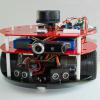Hi
I'm getting this error intermittently on my N2+ when trying to send an HTTP GET command. I'm also getting "IP Address: <ip address>" printed semi regularly that isn't generated from my code. Presumably both are coming from a lower level and I have managed to track down the error message in what appears to be the NETMF firmware files, but it doesn't really make much sense to me.
The code that's generating the error is as below. It's called every 30 seconds from a timer. Can anyone explain what I'm doing wrong or how to get rid of the error? It seems to recover from this most of the time and continue but other times it then stops sending network traffic, although the rest of the program continues on fine.
private static void UploadData(object sender)
{
var URLString = "http://data.sparkfun.com/input/" + sfPublicKey + "?private_key=" + sfPrivateKey + "&humidity=" + humidity.ToString("F1") + "&pressure=" + pressure.ToString("F0") + "&rain=" + rainfall.ToString("F0") + "&temp=" + temp.ToString("F1") + "&voltage=" + voltage.ToString("F2") + "&winddirection=" + windDirection.ToString("F0") + "&windgust=" + windGust.ToString("F1") + "&windspeed=" + windSpeed.ToString("F1") + "&charging=" + charging.ToString();
try
{
using (HttpWebRequest request = (HttpWebRequest)WebRequest.Create(URLString))
{
request.Method = "GET";
request.KeepAlive = false;
request.Timeout = 5000;
request.ReadWriteTimeout = 5000;
using (var response = (HttpWebResponse)request.GetResponse())
{
if (response.StatusCode != HttpStatusCode.OK)
{
Debug.Print("HTTP Status:" + response.StatusCode + " : " + response.StatusDescription);
}
}
request.Dispose();
}
}
catch (Exception ex)
{
Debug.Print(ex.Message);
}
}














